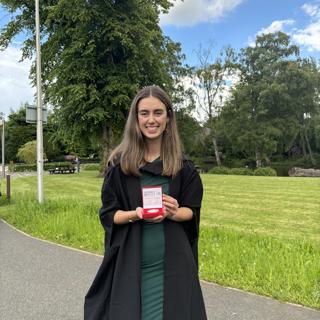Key information
Find out more about our 3 year honours degree option.
- UCAS code
- HP71
- Level
- Undergraduate
- Delivery type
- Full Time
- Degree qualification
- BEng (Hons)
- Mode of delivery
- On-Campus
- Duration
- 3-4 years
- Location
- Edinburgh
- Start date
- September
Robotic and autonomous systems are now used in areas such as autonomous vehicle guidance, healthcare, remote surgery, industrial manufacturing and domestic assistance. This multi-disciplined BEng Robotics degree brings together electronics, computer software, and mechanics.
We were recently ranked 1st in the UK for Electrical and Electronic Engineering (Daily Mail, 2025), reflecting the exceptional quality of our teaching, research, and industry engagement in the field.
In the first three years, you’ll be given a background in all three disciplines, along with the opportunity to build integrated systems. In fourth year, you can either continue with a broad-based curriculum, or specialise in particular aspects of contemporary robotics.
During your studies, you will apply our ‘learning by doing’ philosophy by practically developing your skills beyond traditional academic content. You’ll work on both individual and group projects from third year onwards, gaining valuable hands-on experience. The projects challenge you to solve a 'real life' problem – such as the project in which our students helped design an electronic egg to monitor penguin incubation. You will be taught how to use industry-standard equipment and facilities, and will be supported and encouraged by staff to use the equipment to further your studies, and innovate creative engineering solutions in your personal time.
Why study Robotics?
Robotics and AI are seen as key technologies for the future and the subject of massive commercial investment.
There is a rapidly growing worldwide demand for graduates with the technical skills and industry awareness to create an innovation pipeline from academic research to global markets in the field of robotics. Key application areas include manufacturing, assistive and medical robots, offshore energy, environmental monitoring, search and rescue, defence, and support for the aging population.
Apple, Google, Uber, Amazon and Facebook all have major ongoing research programs in robotics. In the UK, Dyson, 5AI and a plethora of SMEs and start-ups are trying to grasp the huge market opportunity that is foreseen. Predictions of the worldwide economic impact of Robotics and Autonomous Systems range from US$1.7 trillion to US$4.5 trillion by 2025.
Your student experience
Your learning will be informed by the expertise of our research-active robotics and electrical and electronic engineers and academics.
96% of Heriot-Watt University’s engineering research was classed as world-leading in the REF 2021 review, which ranked us 1st in Scotland and 3rd in the UK for engineering research through a joint submission with the University of Edinburgh.
We were recently ranked 1st in the UK for Electrical and Electronic Engineering in the Daily Mail University Guide 2026. Heriot-Watt University also achieved 3rd in Scotland for Electrical and Electronic Engineering in the Guardian University Guide 2026.
Our BEng Robotics, Autonomous and Interactive Systems draws upon the world class research carried out by Heriot-Watt as part of the EPSRC Centre for Doctoral Training in Robotics and Autonomous Systems (CDT-RAS). The centre is leading in the UK effort to realise the potential of Robotics and AI technology, by producing a new generation of highly skilled researchers, trained to take a central role through technical skill coupled to industry and marketing awareness.
You will also benefit from the work completed by the on-campus National Robotarium. The multimillion-pound UK innovation hub for robotics and autonomous systems has been built in collaboration with the University of Edinburgh and delivers leading research and support for business creation and growth. The presence of the National Robotarium provides you with the opportunity to gain knowledge and skills at the forefront of robotics and AI.
The research relevance of this undergraduate programme ensures your studies remain cutting-edge and industry focused.
Go Global
There are currently no Go Global opportunities for this particular programme. However, other Go Global opportunities may be available. Please contact studywithus@hw.ac.uk for more information.
Course content
September Intake - Edinburgh
Year 1
Provides the basic mathematics, electronics, programming, and mechanical engineering skills that form the core knowledge for later work.
Mandatory September
- Introduction to Electrical and Electronic Engineering
- Praxis Electronic Design
- Mathematics for Engineers and Scientists 1
- Software Development 1
Mandatory January
- Praxis Programming
- Robotics group project
- Mathematics for Engineers and Scientists 2
- Software Development 2
Year 2
Builds on the core skills with more advanced electronic engineering, software and mechanical engineering topics. Concepts of robotics and autonomy are introduced through courses on robot kinematics and autonomous vehicle control. This work is supported by practical activities.
Mandatory September
- Digital Design and Programming
- Circuits and Analysis
- Mathematics for Engineers and Scientists 3
- Introduction to Data Structures and Algorithms
Mandatory January
- Computer Architecture and Embedded Systems
- Introduction to Robotics
- Mathematics for Engineers and Scientists 4
- Data Structures and Algorithms
Year 3
Includes more advanced specialisms, including signal processing, artificial intelligence, graphics and system design. There is a large team design project that builds on and integrates the taught material.
Mandatory September
- Probability, Statistics, and Information Theory
- Sustainable Development and Engineering Management
- Signals and Systems
- Artificial Intelligence and Intelligent Agents
Mandatory January
- Time and Frequency Signal Analysis
- Electrical Power and Machines
- System Project
Year 4
Options allow the student to focus on particular areas of interest. Topics include: robotics and automation, embedded systems, signal and image processing, virtual worlds and interaction, and biologically inspired computing. A project covering the full year allows the student to investigate and solve a significant science or engineering problem.
Mandatory September
- 4th Year Project 1
Optional September
- Linear Control
- Embedded Systems
- Robotics Systems Science
- Dynamics 1
- Biologically Inspired Computation
- Data Mining and Machine Learning
- Intelligent Robotics
Mandatory January
- 4th Year Project 2
Optional January
- Data Visualisation and Analytics
- Advanced Network Security
- Big Data Management
- Distributed and Parallel Technologies
- Advanced Digital Electronics
- Embedded Software
- Advanced Reading
- Image Processing
- Robotic Mechanical Systems
- Advanced Human Computer Interaction
- Games Programming
- Advanced Software Engineering
Disclaimer
The courses mentioned above may change between now and the time that you study. For more information, please view our Terms and Conditions.
Programme Video
Robotics video
Student testimonials
See moreI chose to study MEng Robotics, Autonomous and Interactive Systems as it involved a wide mix of computer sciences and electrical engineering. Over the years, I have taken part in several committees, including Robotics and Signing societies. Each of them has been essential in teaching me new and diverse skills. I was also a member of the CanSat Society. CanSat is an annual student design-build-launch competition organized by the American Astronautical Society.
Fees and funding
| Status | Fee |
|---|---|
| Scotland | Paid by SAAS |
| England / Wales / N Ireland / Rep of Ireland | £9,790 |
| International | £25,808 |
- Status: Your residency status is usually defined as the country where you have been ordinarily resident for the three years before the start of your course.
- International: 'International' includes applicants from European Union countries who do not hold Pre-Settled or Settled status in UK. (This does not include students from the Republic of Ireland - see above).
Scholarships and bursaries
Bursaries for students from England, Northern Ireland or Wales
In addition to government loans and grants towards the costs of fees and living costs, we are offering generous financial support to attract and support eligible undergraduate students from England, Northern Ireland or Wales:
- Heriot-Watt University Bursary (up to £3,100 per year)
Entry requirements
We have standard entry requirements for all of our courses that you will have to meet.
Year 1
Standard entry requirements
- Highers AABB (over two sittings). Must include Maths and one of Physics, Technological Studies, Engineering Science, or Computer Science, with one required subject achieved at A.
- A-Levels BBC. Must include Maths and either Physics or Electronics, with required subjects at BB.
- International Baccalaureate 29 points. Must include Physics and Maths, both at Higher Level 5.
- BTEC Extended Diploma DMM. Must be relevant science subject including sufficient Physics and Maths.
- HNC A in graded unit. Must be relevant science subject including sufficient Physics and Maths. All HNCs must include Engineering Maths 1 and one of Engineering Maths 2 or 3.
- HND BB in graded unit. Must be relevant science subject including sufficient Physics and Maths. All HNDs must include Engineering Maths 1 and one of Engineering Maths 2 or 3.
- Please check that you meet our University-wide National 5/GCSE (or equivalent) English and Maths requirements.
Minimum entry requirements *
- Highers BBBC (over two sittings). Must include Maths at B and further B in one of Physics, Technological Studies, Engineering Science or Computer Science.
- A-Levels BCC. Must include Maths and either Physics or Electronics, with one required subject at B.
- International Baccalaureate 28 points. Must include Physics and Maths, both at Higher Level 5.
- BTEC Extended Diploma MMM. Must be relevant science subject including sufficient Physics and Maths.
- HNC A in graded unit. Must be relevant science subject including sufficient Physics and Maths. Graded Unit at B will be considered if additional maths has been achieved. All HNCs must include Engineering Maths 1 and one of Engineering Maths 2 or 3.
- HND BB in graded unit. Must be relevant science subject including sufficient Physics and Maths. All HNDs must include Engineering Maths 1 and one of Engineering Maths 2 or 3.
* Minimum: under our Fair Access Policy, we will relax our standard entry requirements for some Scottish and Rest of UK status students depending on their circumstances. Our minimum requirements will apply if you:
- live in an area within the Scottish Index of Multiple Deprivation lowest 20% (SIMD20) or POLAR4 Quintile 1 regions (RUK)
- or are care experienced.
We can also make exceptions for some Scottish students with grades above minimum but below standard. Read more about our Minimum and standard entry requirements.
Year 2
- Advanced Highers AB. Must include Advanced Higher Physics and Maths, and meet Year 1 Higher AABB requirements.
- A-Levels BBB to include Physics and Maths.
- International Baccalaureate 34 points. Must include Physics and Maths at HL 6.
- BTEC Extended Diploma DDD. Must be in relevant science subject, including sufficient Physics and Maths.
- HNC A in graded unit. HNC must include sufficient Physics and Maths, including SQA units Engineering Maths, 1, 2 & 3. Year 2 entry with HNC is only available to applicants eligible for a minimum offer.
- HND AA (standard entry) or AB / BA (minimum offer eligible only). Must include sufficient Physics and Maths including Engineering Maths 1,2 & 3. HND BB will potentially be considered for minimum eligible applicants who have achieved additional suitable maths qualification.
- Global College Successful completion of our Engineering with Foundation
Additional information
- For all years, applications are welcomed from holders of non-school qualifications, mature candidates and overseas students.
- If you do not see your qualifications here please contact us at studywithus@hw.ac.uk
- For applicants studying HNC, HND or BTEC qualifications, when submitting your application please ensure you list in full all the units you are currently studying, as specific units (e.g. in Maths) may be required.
English language requirements
If your first language is not English, we'll need to see evidence of your English language ability.
The minimum English language requirement for entry to this programme is IELTS 6.0 (or equivalent) with no score lower than 5.5.
If you do not have IELTS 6.0, we offer a range of English language courses to help you meet the English language requirement for this programme prior to commencing your studies.
Please see our detailed English language requirements.
Why Heriot-Watt
We're the top university in Scotland for graduate outcomes which means that more of our graduates are employed or in postgraduate education than any other institution in the country and we ranked 5th in the UK.
We're also rated number one in the UK for CEO or MD roles, meaning more of our graduates go on to become CEOs or MDs than any other university in the whole of the UK. On top of that, we have beautiful campuses, across the globe, so you'll get a truly international education. Our Edinburgh Campus is home to Oriam, Scotland's National Sports Performance Centre combined with plenty of wellbeing resources, prioritising fitness and mental health for all students. Our Global Research Institutes look at solving real world issues such as climate change and saving our oceans as well as working on the next medical technological breakthrough and the future of AI and robots.
Employability
Work and study
Salary
Potential career paths
- Engineering professionals
Student life
Explore facilities, and chat to staff and students
Discover Uni course data
Discover Uni provides data on each university's degree courses across a range of measures including student satisfaction, graduate jobs and salaries.







